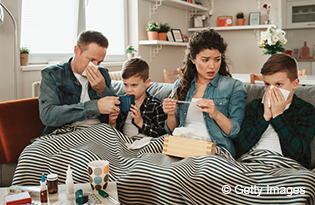Which cold medicine is the best one to use?
1/23/2024 by Denise Dupras, M.D., Ph.D.

It's that time of year. Winter is the high season for the common cold. There's no cure for the common cold, but there are tips to help treat the symptoms.
Stop the spread.
- Hand-washing is key. The germs from a cold are spread through sneezes or coughs, and then you are breathing the germs in. Wash your hands well — and often — with soap and water. If you can't wash with soap and water, an over-the-counter hand sanitizer works well.
- Wear a face covering when around others to stop the spread.
- Avoid touching your face, eyes and nose. That's how germs get in.
- Disinfect highly touched surfaces around you, like doorknobs and counters.
- Stay home if you are not feeling well. This tip includes not bringing your children to daycare or school if they are ill.
- Be wary of herbal or other remedies, as many of these have not been studied to determine their impact and whether they may be harmful.
What about cold medicines?
- Cold medicine is not recommended for children, and certainly not for those under age 6, as they're more susceptible to side effects. Instead, use an over-the-counter nasal saline. This solution comes in drops for infants and a spray for older children. Using the nasal saline and then suctioning the nose can provide relief.
- Be mindful of antihistamines, as these can be sedating or have other side effects. In a small percentage of children, these medicines can cause agitation or hyperactivity.
- Have a cough? Try honey. It's been shown to be as effective as some of the over-the-counter cold medicines. You can take one teaspoon of raw honey every couple of hours as needed or mix it with warm water to thin it out. Do not give honey to babies under age 1, as it can make them sick with botulism.
- Adults also benefit from nasal saline sprays or rinses for congestion. If you have a cough, you can try an antitussive, also known as a cough suppressant.
- Cool mist humidifiers are important for people of all ages. These give off a mist that puts moisture in the air, soothing nasal passages and softening up that congestion.
- Be wary of combination cold remedies. It's easy to take too much of one or more ingredients. Be sure to read labels carefully
- Avoid oral decongestants – they don't work. A recent review suggests that while the nasal spray — phenylephrine — provides temporary relief of nasal congestion, taking a pill doesn't relieve a stuffy nose.
Talk to your primary care clinician or pharmacist to find the best medication to help relieve your symptoms. Some over-the-counter medicines will interfere with prescription medications.
When should you schedule an appointment?
- If you or your child are feeling short of breath, have a high fever or there's pain or discomfort in your chest, you should seek medical attention immediately.
- Fevers in infants younger than 3 months of age need to be checked out right away.
- For older children and adults, if a fever lasts longer than 3 to 4 days, you should contact your primary care clinician.
- If symptoms last longer than 7 to 10 days or you continue to get worse, contact your primary care clinician.
And remember, antibiotics do not work for colds. A cold is caused by a virus, while antibiotics are used for fighting bacteria. Taking antibiotics when you don't need them can lead to side effects.
Denise Dupras, M.D., Ph.D., is a physician in Community Internal Medicine, Geriatrics and Palliative Care at Mayo Clinic in Rochester, Minn. She earned her medical and doctoral degrees at Mayo Clinic Alix School of Medicine and completed her residency in internal medicine at Mayo Clinic in Rochester. Her interests include medical education, evidence-based medicine and care of LGBTQIA+ patients.
